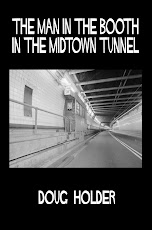Hollywood and Sunset:
The Whole World Is A Stage - In Luke Salisbury’s Novel
Doug Holder
It is often very hard to read people, not to mention to decode the chaos of the world. It can be challenging to decide when someone is putting on a maudlin act, or when he or she is the authentic goods. Luke Salisbury, brings the reader into the La La Land of Los Angeles around the time of World War I, and throws us into a celluloid dream, in his novel, Hollywood and Sunset. This fourth novel by Salisbury was well-received by critics and won The Benjamin Franklin Award from the Publishers Marketing Association. This is a world where illusion and reality merge, making us question the very nature of the two.
The novel concerns a down-at-the heels Atlantic Monthly writer and minor league baseball club owner Henry Harrison and his attempt to interview the great filmmaker D.W. Griffith. D.W. Griffith produced the seminal silent film Birth of a Nation. This lauded and much denounced film concerned the Reconstructionist South after the Civil War, and was viewed by many camps as portraying the Negro in a racist light. The fictional Harrison, an East Coast liberal with a Harvard pedigree, wants to expose and denounce Griffith; in essence ruin Griffith’s career and thus his life. Harrison, not a pillar of stability himself, is in a midst of a divorce and not far from a complete nervous breakdown. In a brilliant conceit by Salisbury, his character Harrison is led around town by a less-than-pious British actor dressed like Jesus Christ. This Jesus has a hankering for the ladies, a world-weary and biting sarcastic tongue, but at the same time tries to save his flock, in this case being a hapless and downtrodden Harrison. Harrison has quite a journey which includes a one night unconsummated fling with the silent actress icon Lillian Gish. This of course angers the possessive and married D. W. Griffith who wants to wed his star. Eventually this course of events leads to a life-changing confrontation between the two men.
Salisbury a tall, distinguished man in his late 50’s, initially has a patrician air about him, but soon proves to be unaffected and engaging. Although his own past hints of prep school and privilege, he has taught at Bunker Hill Community College in Charlestown, for the past twenty years. He enjoys teaching immigrants, students who clearly have to work hard to get their education, and others who make up the diverse student body. Salisbury told me: “The students here are serious about learning. They don’t look at me like I am an idiot for not making $300, 000 a year. People pass through here for every imaginable reason. We are a democratic community college, and teach anyone who can walk through the door.”
Hollywood and Sunset takes place in Los Angeles, a location where the physical possibilities end with the Pacific Ocean. Against this backdrop the imagination thrives. Men like Griffith sell images, illusions; they constantly reinvent themselves and others through the medium of film, or as Salisbury succinctly puts it: “They sell light.”
The book is written in a cinematic style, with in-depth detail of the set Griffith constructed for the film he thought would be his masterpiece: Intolerance.” The milieu that Harrison and D.W. Griffith habituate is almost surreal, with the denizens acting on and off the movie set. Salisbury keeps the reader guessing as to what is real and what is simply for show.
Salisbury said of Griffith: “In the book and in real life D.W. Griffith was his greatest contribution or invention. He created himself as a Southern gentleman, tried and became a great artist, and tried to live down the stigma of racism Birth… brought him. Griffith couldn’t stop creating. That was what was real for him.”
Salisbury said that Griffith was a source of fascination for him because the man was obsessed with the new “universal language”: silent films. A virtual Babel of people could understand them, and relate to them; there was no language barrier. Salisbury points out that Griffith was: “A master of symbols, the culture, and the great collective memory.”
This world of images; the freedom they created from the confines of convention, often proved to be the downfall of people who chased the dream. Youth, and unapologetic self-absorption was and is at a premium on Hollywood and Sunset, and as one of Salisbury’s character says: “There is no place for old women in Hollywood.” And as anyone knows Sunset Boulevard is littered with broken people and their dreams.
Salisbury also teaches film courses in addition to English, and feels that films are an important artistic medium that should be part of the curriculum. Although his favorite movie, Vertigo, is not as complicated as, say, Hamlet, Salisbury feels a great deal of valuable things can be gleaned from Hitchcock’s masterwork. Salisbury finds that his current crop of students is bombarded with images from TV, the internet, and film. Therefore the “selling of light” will increasingly take precedent over books. This was something Griffith realized even way back in 1916.
For more information about Luke Salisbury go to http://wwwlukesalisbury.com
Wednesday, July 9, 2008
Subscribe to:
Post Comments (Atom)

No comments:
Post a Comment